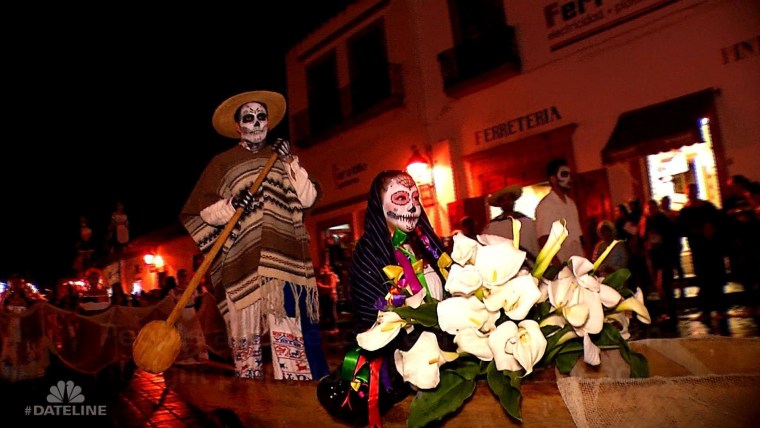Catalina Marcelino, 42, usually spends the days before November making signature Mexican dishes, like mole and tamales, to celebrate el Día de los Muertos, or Day of the Dead, the tradition originating in Mexico which celebrates the life of loved ones who are deceased.
The Freehold, New Jersey resident says the celebrations on Nov. 1 and 2 will be very different for her family this year. They're still reeling from the death of her father-in-law, Wilfredo Noyola, 68, who passed away this summer from coronavirus complications. Her Mexican-born father-in-law, who worked at a car wash, was intubated for a month before he died at the hospital, without any relatives with him.
"It was horrible—it's something really difficult that words can’t describe,” said Marcelino.
Marcelino will forgo a large, extended family celebration because of coronavirus restrictions, but she will still have Noyola's photo as well as some of his favorite things on top of the ofrenda, or altar, the family will make to honor him. “It’s something really hard," she says, reflecting on his death, "but by the grace of God, we’ll survive.”
According to Día de los Muertos tradition, the souls of deceased children come down from heaven and reunite with their families on Nov. 1, while the souls of deceased adults come to visit on Nov. 2. Families often commemorate the holiday through festivities and decorating altars that are often covered in portraits, flowers, candles and food.
“Whereas Halloween makes fun of death and invokes terror, the Day of the Dead is anything but terror. It is about the connection between the here and the now, and the other worlds that we know as the afterlife,” says scholar and author Ilan Stavans, a professor of Humanities and Latin American and Latino Culture at Amherst College.
“In this time of terrible suffering, when a pandemic is decimating people of color, the Day of the Dead goes way beyond what pop culture offers us,” says Stavans. “It’s a lesson in empathy across the spiritual world. And an opportunity for solace because while those who we love die, they are still here with us, they still protect us, they look over us.”
This year, a different kind of celebration
The coronavirus pandemic has posed a challenge for those wanting to uphold the venerated tradition.
Jennifer Zepeda, 25, and her family own a small Mexican party store and are used to setting up an altar inside to share with their local Santa Rosa, California community. Her family would often go to Mexico several times a year and bring back items for their altar but with the pandemic, they haven’t been able to visit. She insists that won’t stop them from decorating.
Juan Frias, 35, didn’t grow up celebrating Day of the Dead, but as he grew older, he wanted to connect to his Mexican roots and honor his grandparents who had passed. The bank manager and design consultant decided to make his first altar six years ago and now has one all year long in his McAllen, Texas home.
Frias originally was planning on celebrating in Oaxaca this year with his friends, but the CDC is recommending people reconsider travel to Mexico due to Covid-19. Frias says he doesn’t mind staying home in the U.S. and has been uploading videos on TikTok to help inform other Latinos interested in learning more about their heritage.
This year, Mexican authorities have decided most cemeteries will remain closed to curb the spread of the pandemic. This is a big change in the celebration, since as Stavans explains, families traditionally spend time with their departed in physical and spiritual ways.
Some families go to the cemetery, even sleeping over next to the tombs of their loved ones. They make the ofrendas (offerings) with food, candles and music. Others dance and sing, celebrating their connection with the afterlife, which dates back over a millennia to popular Indigenous beliefs.
Stavans will publish in November the “Popol Vuh,” a retelling of the Maya creation story that influenced modern-day Latino beliefs, including the Day of the Dead.
Indigenous cultures have different versions of the afterlife, Stavans says. But they all coincide in calling to our attention what's beyond our lived experiences.
“The Day of the Dead is a perfect example of the ongoing relationship that we have with our loved ones," says Stavans, "which goes way beyond death.”
Follow NBC Latino on Facebook, Twitter and Instagram.
"who" - Google News
November 01, 2020 at 05:10PM
https://ift.tt/3jMXiuP
On Día de los Muertos, Latino families honor relatives who died from Covid - NBC News
"who" - Google News
https://ift.tt/36dvnyn
https://ift.tt/35spnC7
Bagikan Berita Ini















0 Response to "On Día de los Muertos, Latino families honor relatives who died from Covid - NBC News"
Post a Comment